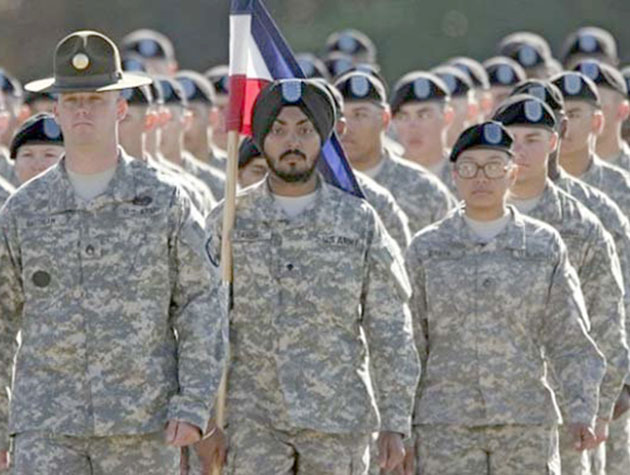
WASHINGTON - Two U.S.-based rights groups have filed a lawsuit against the U.S. Army for allegedly not enlisting a Sikh student in the Reserve Officer Training Corps programme, unless he shaved his beard and cut his hair. The lawsuit, filed by United Sikh and American Civil Liberties Union (ACLU) yesterday, in the U.S. District Court for the District of Columbia, asks the court to order Army officials to permit Singh to...

enlist in Reserve Officer Training Corps (ROTC) while maintaining his religious practices. The two groups alleged that the student was denied enlisting, unless he shaved his beard, removed the turban and cut his hair. Iknoor Singh, a student of Hofstra University had requested a religious exemption from military rules so that he could join ROTC – pursuing his life-long dream of serving in the Army – without violating his faith, United Sikh said in a statement. But Army officials rejected his request, it alleged.
The lawsuit argues that the Army's denial of the religious exemption violates the Religious Freedom Restoration Act (RFRA), which provides heightened legal protections for religious exercise.
"Sikhs have a rich tradition of military service around the world, where they are permitted to serve with their articles of faith intact," Manmeet Singh, a staff attorney with United Sikhs, said.
"Our client should not be denied the honour of joining ROTC merely because of his faith," he added. United Sikh alleged that after first claiming that Singh's requested accommodation would undermine readiness, unit cohesion, standards, health, safety, and discipline, the U.S. Army officials later switched tactics and said they could not rule on Singh's request because he had not "formally enlisted". They admit that, once he enlists, Singh will have to comply with the rules and violate his faith "unless and until" an exemption is granted. "Our military should strive to welcome and accommodate recruits of all faiths," said, Heather L Weaver, senior staff attorney with the ACLU Program on the Freedom of Religion and Belief. "Religious diversity is a strength, not a weakness," Weaver added.
Born and raised in Queens, New York, Singh speaks four languages (English, Punjabi, Hindi, and Urdu) and hopes to one day become a military intelligence officer.
The lawsuit argues that the Army's denial of the religious exemption violates the Religious Freedom Restoration Act (RFRA), which provides heightened legal protections for religious exercise.
"Sikhs have a rich tradition of military service around the world, where they are permitted to serve with their articles of faith intact," Manmeet Singh, a staff attorney with United Sikhs, said.
"Our client should not be denied the honour of joining ROTC merely because of his faith," he added. United Sikh alleged that after first claiming that Singh's requested accommodation would undermine readiness, unit cohesion, standards, health, safety, and discipline, the U.S. Army officials later switched tactics and said they could not rule on Singh's request because he had not "formally enlisted". They admit that, once he enlists, Singh will have to comply with the rules and violate his faith "unless and until" an exemption is granted. "Our military should strive to welcome and accommodate recruits of all faiths," said, Heather L Weaver, senior staff attorney with the ACLU Program on the Freedom of Religion and Belief. "Religious diversity is a strength, not a weakness," Weaver added.
Born and raised in Queens, New York, Singh speaks four languages (English, Punjabi, Hindi, and Urdu) and hopes to one day become a military intelligence officer.

 RSS Feed
RSS Feed
